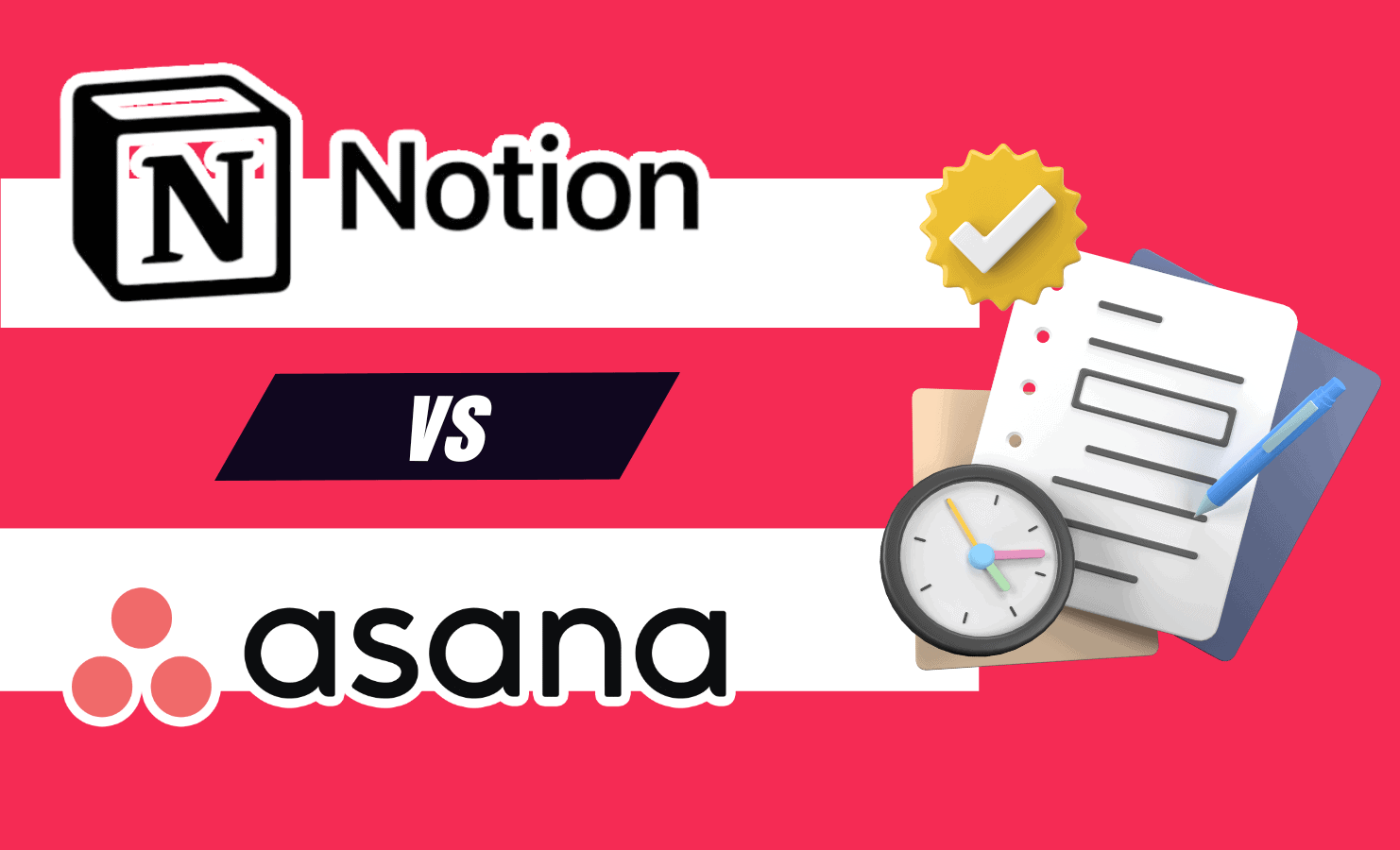
Why you can trust us
- 407 Cloud Software Products and Services Tested
- 3056 Annual Software Speed Tests
- 2400 plus Hours Usability Testing
Our team of experts thoroughly test each service, evaluating it for features, usability, security, value for money and more. Learn more about how we conduct our testing.
3.85 |
4.3 |
|
|
Key Takeaways: Notion vs Asana for Project Management
- The main difference between Asana and Notion is that Asana has advanced project management capabilities and few collaboration tools, whereas Notion has advanced collaboration features and basic project management tools.
- If you need robust real-time document creators, asset managers and wikis, Notion might be a better choice for you and your team.
- If you need a do-it-all project management suite with advanced workflow tools, powerful resource management features, plenty of integrations and a top-notch free plan, Asana might be the better choice.
Ask anyone about project management software, and Asana will most likely pop up. However, as seen in our Notion review, this relative newcomer has been making waves thanks to its work management capabilities and collaboration features. In this Notion vs Asana comparison, we’ll help you pick between these Agile platforms.
By the end of this comparison, you’ll know if you should pick Asana or Notion — both of which appear in our roundup of the best project management software — to help plan, organize and execute tasks while managing your project team.
Meet the experts
Learn more about our editorial team and our research process.
Cloudwards Editor’s Choice: Asana
While Asana falls short in the real-time collaboration tools department, it’s still the best project management software when pitted against Notion. As we explored in our Asana review, it offers more robust project management features, intuitive task management tools, a friendlier interface and excellent integration support. Asana also offers a stellar free plan, which you can use to test its features.
Notion vs Asana: Features Comparison at a Glance
| $8 / month(All Plans) | $10.99 / month(All Plans) | |
| Review | Review | |
| Management Views | ||
| Kanban board | ||
| List | ||
| Calendar | ||
| Timeline | ||
| Spreadsheet view | ||
| Gantt charts | ||
| Workload planning | ||
| Long-term planning | ||
| Management Features | ||
| Multiple project management | ||
| Dependency management | ||
| Native scrum management | ||
| Set user permissions | ||
| File storage | ||
| Time-tracking | ||
| Built-in integrations | ||
| Reporting features | ||
| General Features | ||
| Free plan | ||
| Free Trial | 30 days | |
| Web app | ||
| Windows | ||
| MacOS | ||
| Android | ||
| iOS | ||
| Support | ||
| Ticket-based support | ||
| Tutorials | ||
| Knowledgebase | ||
| Forum | ||
| Live chat | ||
| Phone support |
Which Is Better: Notion vs Asana?
Asana and Notion are competent project management platforms, but our team of experts feels that Asana is the better project management tool. While Notion excels in real-time document creation and team collaboration, its workflow tools aren’t robust, making the platform suitable for basic project management only.
Asana’s workflow tools — namely its kanban boards, Gantt charts, lists and dashboards — are intuitive, customizable, colorful and simple to navigate, which makes the platform easy to use.
Conversely, Notion’s interface and tools are minimalistic and monotone, and navigation can be a chore. Notion also has a steep learning curve compared to Asana, so it’s harder for teams to hit the ground running.
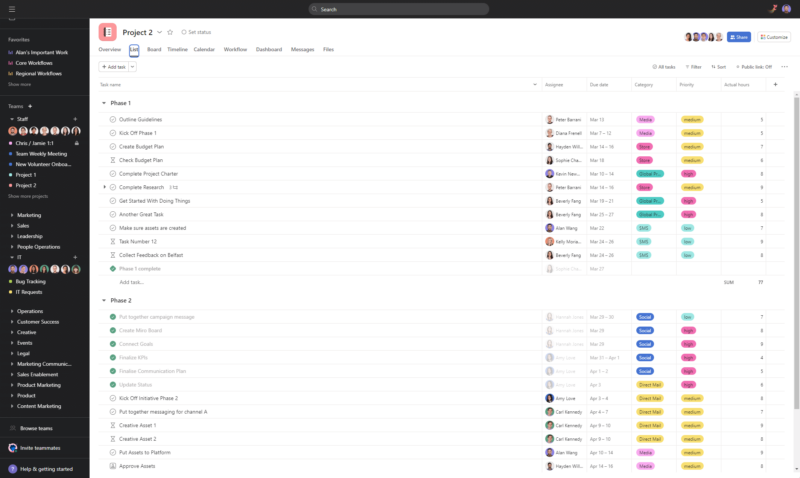
Asana’s workflow tools are colorful and intuitive.
Notion’s AI, document creation tools and wikis are suitable for marketing teams. However, Asana can handle multiple project management methodologies across many industries. Asana’s task and resource management tools and its portfolios for multiple projects make it the ideal project management solution for most teams.
Who Is Notion For?
- Marketing teams: Notion’s real-time document creation tools and task management features allow marketing teams to collaborate on campaigns and track project progress.
- Designers: The platform’s wikis, document creators and file management solutions allow design teams to discuss projects, create documents, and share and store digital assets.
- Engineers: Notion’s project scope templates, task managers and document management system for storing plans can help engineers complete work promptly.
Who Is Asana For?
- Operation managers: Asana’s resource and workload management tools, accessible views and detailed dashboards allow you to see company-wide workflows and workloads.
- Designers and professional service teams: Its powerful document management system, proofing tools, timelines and intuitive kanban boards make Asana ideal for marketing and creative teams.
- Distributed teams: Asana’s fluid communication inbox and its ability to integrate with tools like Slack and cloud storage services make it perfect for remote teams.
If You Want to Consider Other Services, Check Out…
We understand that Asana and Notion might not be everyone’s cup of tea. So, below you’ll find a shortlist of other project management tools that offer many robust features.
- monday.com — An all-in-one workspace for planning, assigning tasks, managing resources and more. There’s no better dedicated project management tool. Find out more in our monday.com review.
- ClickUp — Real-time team collaboration tools and straightforward task management features make ClickUp ideal for creating and managing projects. Check out our ClickUp review.
- Zoho Projects — Zoho Projects’ user-friendly interface and integrations with Zoho and third-party apps make it very versatile. You can learn more in our Zoho Projects review.
- Airtable — With a customizable interface that can be altered to fit any project, Airtable is a productivity tool that’s suitable for any industry. Here’s our Airtable review.
Notion vs Asana: Pros & Cons
Notion Pros:
- Collaboration tools: Notion’s real-time communication and document creation tools allow teams to work together effortlessly.
- Competitive pricing: Notion’s paid plans are competitive and cost less than Asana’s if you don’t need AI.
- Security:Thanks to strong encryption and robust security features, your data is well protected.
Notion Cons:
- Weak free plan: Notion’s free plan is very poor and is only suitable for individual use.
- Basic workflow management: Due to the basic nature of the workflow tools, Notion is suited for simple task management duties.
- Bland design: Some might appreciate Notion’s monochromatic design philosophy, but most will dislike its bland styling and often clunky navigation.
Asana Pros:
- Generous free plan: Asana’s Personal tier is full of features and tools that teams of up to 10 people can use without having to trouble the company accountant.
- Advanced work management tools: The kanban boards, Gantt charts, calendars, lists and dashboards are very intuitive and can be customized to your heart’s content.
- User-friendly: Asana has one of the cleanest, most colorful user interfaces in this realm, and to top it off, it’s easy to learn and navigate.
Asana Cons:
- Pricey plans: Asana’s paid tiers are costly, and there’s a considerable jump in price between the plans.
- Lack of real-time collaboration tools:Unlike Notion, Asana skimps on real-time document creation, wikis and chat tools.
- Limited time tracking:Asana offers a native time-tracking tool, but it’s only available in the upper paid tiers.
Notion vs Asana: Similarities
Like most project management tools, Asana and Notion have many similarities. In the following sections, we’ll cover the key features that both project management platforms have in common.
Core Features
Notion and Asana offer a wide array of workload and resource management tools as well as workflow management views. These features can help teams create projects, assign and manage tasks, add due dates and streamline communication. All of the tools combine to help project managers lead their projects efficiently.
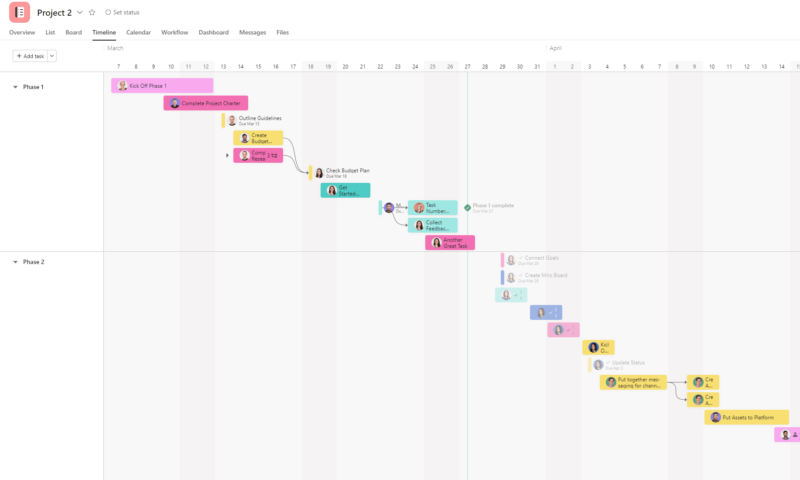
Asana’s colorful timelines take the sting out of using Gantt charts.
Both offer kanban boards and Gantt charts, calendars and lists that support task dependencies. You’ll find templates that can create project boards in seconds, unlimited file uploads, collaboration tools, integrations and automations, and robust security and admin controls. Notion and Asana also offer time-tracking features, document management and proofing tools.
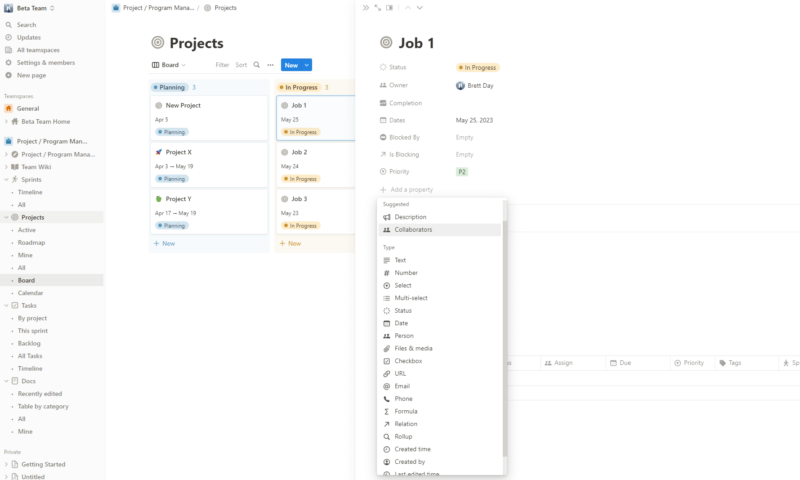
Notion’s workflow management tools have a minimalistic design.
Integrations and Automations
Asana is a class leader regarding integrations, and Notion isn’t too far behind. Both platforms make it easy to find and configure integrations with many leading platforms like Slack, time trackers, customer relationship management (CRM) tools, Adobe Creative Cloud, Google Drive, Google Docs, Zoom, Canva and more.
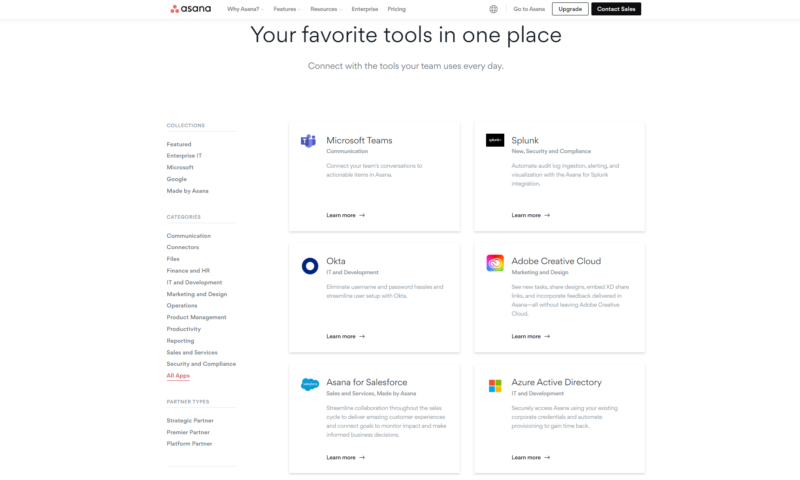
Asana offers one of the largest collections of integrations.
Asana and Notion can also help lift project burdens thanks to automations. You can automate workflows and calendar entries, generate recurring tasks, create tasks via email and make the software message team members when their work status changes. The sky’s the limit. Automations in both platforms are easy to build and implement.
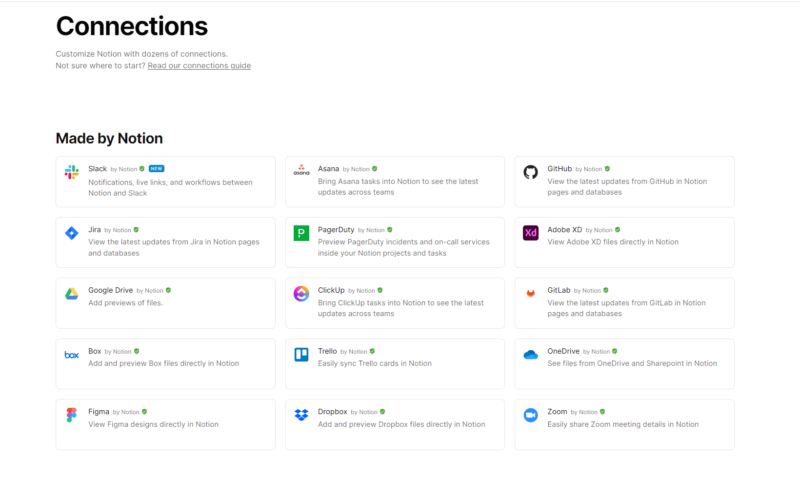
You can connect Notion to many leading software platforms.
Artificial Intelligence
Notion and Asana have embraced artificial intelligence (AI). Project managers can use AI to create smart goals and workflows, turn complex data into actionable items and write status updates.
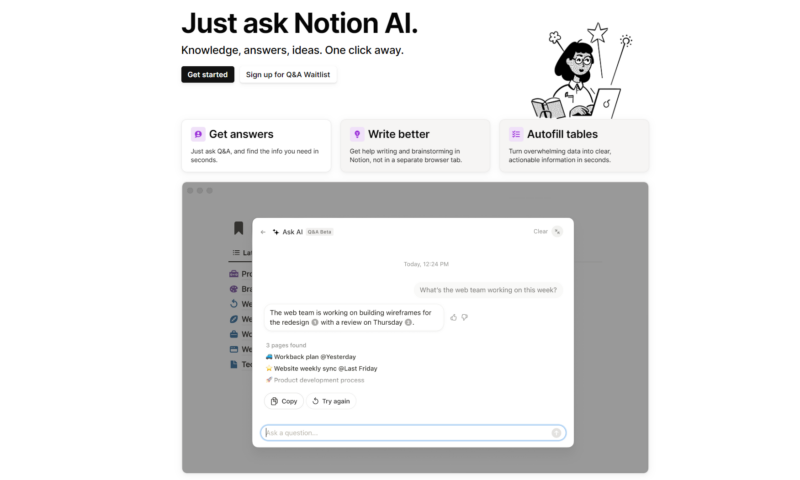
Notion’s AI can help you become a more efficient leader
You can ask the AI questions, have it write emails to team members and more. AI assistants can quickly become essential productivity tools when used correctly. Keep in mind that Asana’s AI is included in its Starter plan, while Notion’s AI is a paid extra. It costs $8 per user per month on yearly plans and $10 per user per month for monthly and free plans.
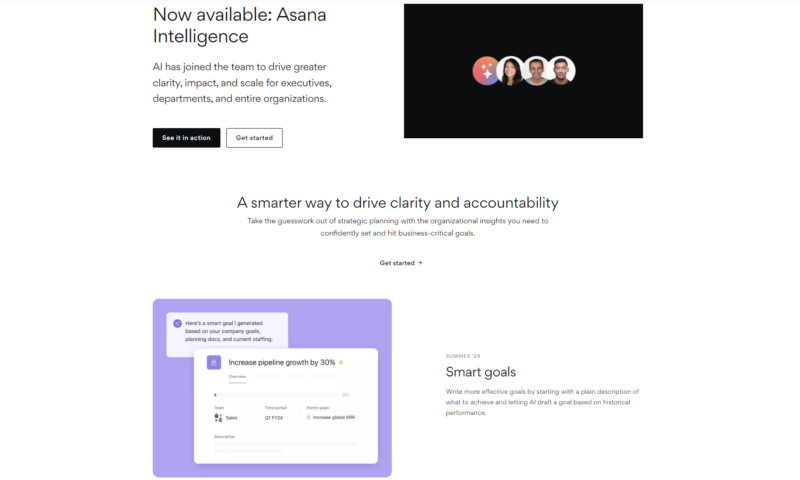
Asana’s AI can help you create smart workflows.
Security and Administration
Notion and Asana take security seriously. Both platforms use AES 256-bit encryption methods to cipher data, and they offer multi-factor authentication and single sign-on (SSO), which can help keep your data secure when scaling. They each support security information and event management (SIEM) integrations and are SOC Type 2 compliant.
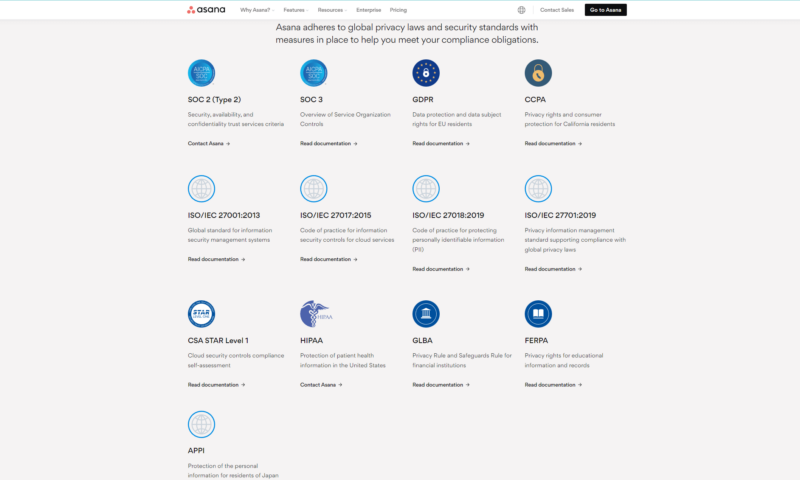
Notion and Asana have similar security and administration feature sets.
Project administrators will appreciate that Notion and Asana allow user provisioning, custom user permissions, managed workspaces, audit logs and more. Rest assured that your data will be secure if you use either platform, and you can limit or grant access to projects, data and documents as needed.
Notion vs Asana: Differences
While Asana and Notion have much in common, some key differences might make you pick one platform over the other. In the following sections, we’ll take a closer look at the key differences between each platform.
User-Friendliness
Asana is much more user-friendly than Notion. Everything in Asana makes sense. The menus are well laid out, allowing you to zip around the platform effortlessly.
Asana’s user interface is bright and colorful, which makes it easy to distinguish between different tasks on kanban boards and Gantt charts. In addition, all the tools and features are intuitive and straightforward.
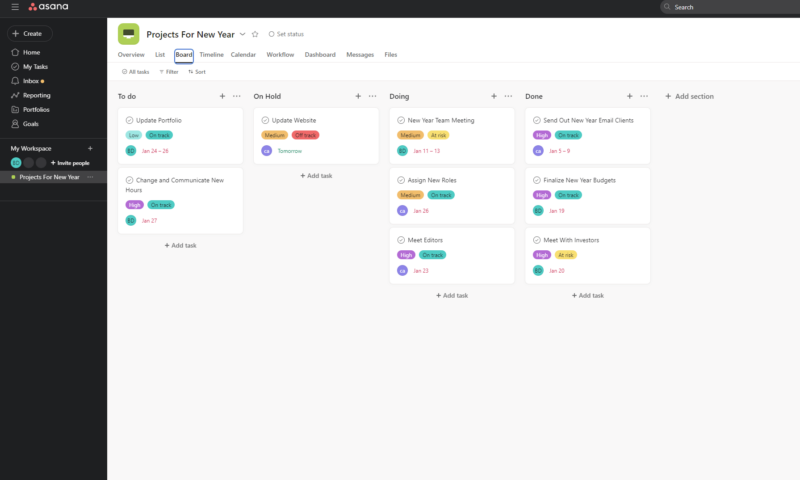
Asana’s simplified menus make navigation a piece of cake.
In contrast, Notion’s minimalistic design and monochrome color scheme make the platform look drab. There are smatterings of pastel colors here and there, but they do little to lift the visuals. Notion is also more complicated to navigate. Instead of the one-click-and-be-there feel of Asana, you’ll find yourself clicking repeatedly to get where you need to be.
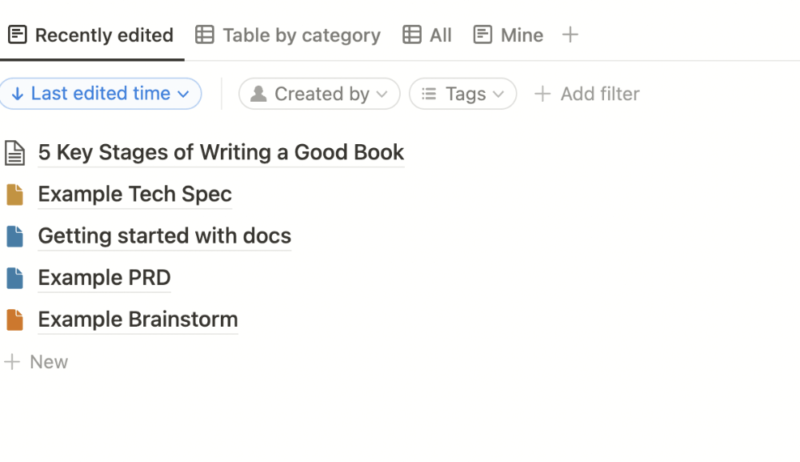
Notion features a dull user interface that can be tricky to navigate.
One positive for both platforms comes in the form of solid knowledgebases and learning academies that can teach you everything you need to know about each platform. Still, teams will be up to speed quicker if they use Asana.
Collaboration Tools
Notion walks all over Asana when it comes to collaboration tools. Asana does allow teams to proof uploaded files, but there aren’t any real-time document creation tools, collaborative whiteboards or brainstorming tools, and chatting is limited to @mentions in task cards.
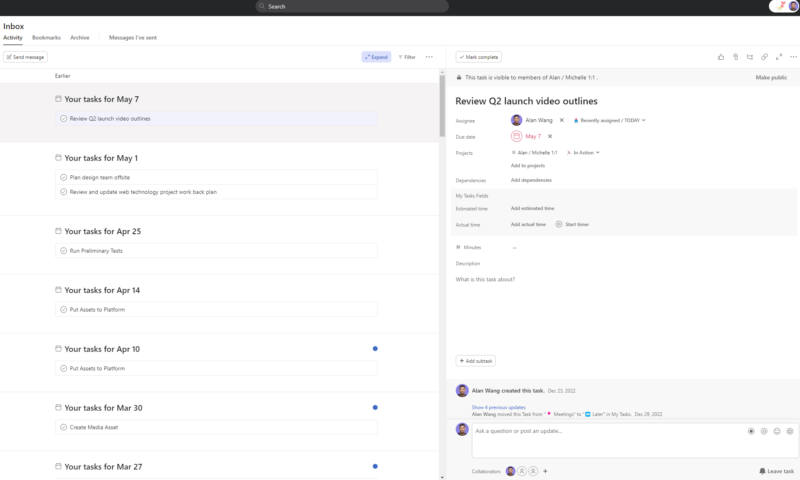
Asana offers a centralized message inbox, but communication
is limited to @mentions within task cards.
In contrast, Notion has wikis, which help teams write and manage internal documents and chat about projects. It offers robust document creation tools that allow multiple team members and project stakeholders to work together anytime, anywhere.
There are also templates that enable teams to create meeting plans, campaign briefs, operating procedures, project scopes and more.
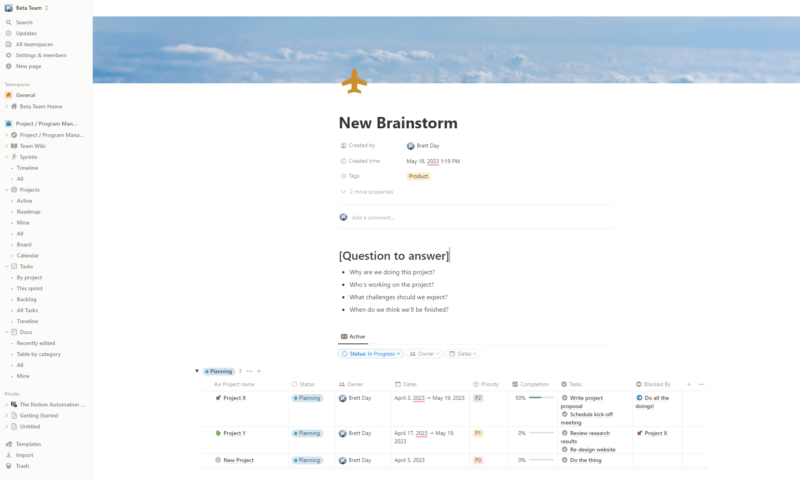
Notion’s collaboration tools enable teams to create internal documentation easily.
Reporting Tools
Those who like analyzing data will appreciate Asana’s reports and customizable dashboards that can show many project metrics.
You can quickly create reports that track time, task statuses, workloads, revenues and budgets, and you can also produce reports that show areas of inefficiency and potential bottlenecks. Asana also lets you export data so that you can create custom reports.
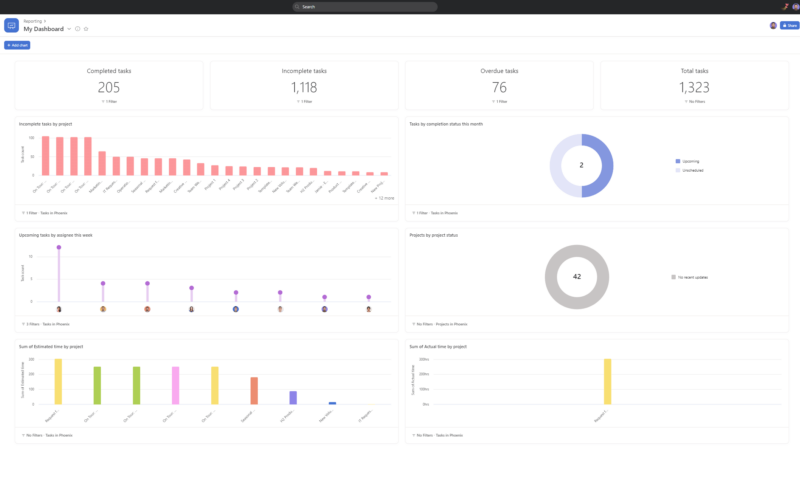
Asana’s dashboards show many project metrics and are easy to customize.
Notion is certainly capable of creating reports, but it does so in a disjointed fashion. You can use Notion AI to pull data from tables to generate reports, and you can also search for report templates or integrate Notion with a service like Tableau. However, Notion doesn’t offer customizable dashboards that can show complex data in a centralized location.
Pricing
Asana offers a generous free plan that supports up to 10 team members and offers unlimited tasks, projects, messages, file storage, multiple views and access to over 100 integrations. Notion’s free plan couldn’t be further from Asana’s if it tried. It’s suitable for individuals and offers basic page analytics, a collaborative workspace for up to 10 guests and basic security.
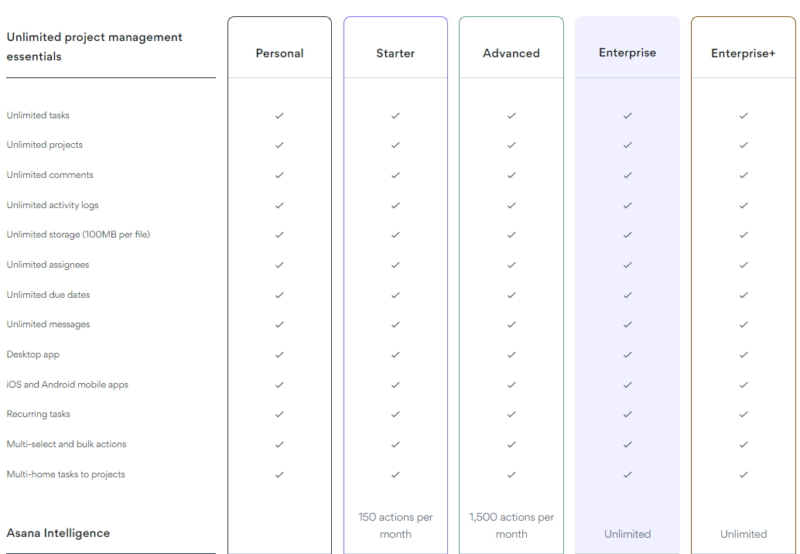
Asana offers a stellar free plan and four paid tiers.
Asana offers four paid plans. The Starter plan, which includes the AI assistant, costs $10.99 per user per month with annual billing. The Advanced plan jumps to $24.99 per user per month paid annually. There are two options for large teams: Enterprise and Enterprise+, both of which are customizable. You can learn more about Asana’s plans in our Asana pricing guide.
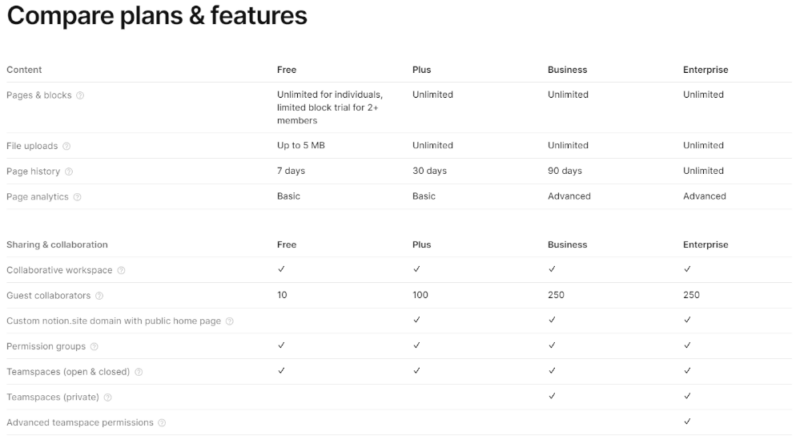
Notion’s pricing model is simple and easy to understand.
Notion offers three paid tiers. The platform’s most popular Plus plan costs $8 per user per month with annual billing. The Business plan increases to $15 per user per month when you pay annually, while the Enterprise plan requires you to call the Notion sales department. Just keep in mind that you’ll need to pay extra if you want the AI tool.
Asana is the way to go if you’re looking for a free plan and plans with more advanced tools. While Notion might look cheaper, you must remember that it charges more for the AI tools. With that factored in, the paid plans are comparable between the two platforms.
The Verdict: Why We Think Asana Wins Overall
Overall, Asana is the best project management software for most teams. The platform’s advanced yet user-friendly task views are hard to beat. Asana is easy to navigate and offers plenty of file storage, numerous integrations, detailed reports, robust security and a fantastic free plan.
Notion isn’t bad by any means, and we’re sure that many design teams will appreciate its real-time document creation tools. Still, in terms of raw project management power, Asana is the way to go. Do you agree with our assessment? Will you be taking advantage of Asana’s free plan? Do you prefer Notion? Let us know in the comments, and as always, thanks for reading.
FAQ: Asana vs Notion
-
Yes, Notion is a competitor of Asana. While Notion focuses more on real-time collaboration tools, it still has everything you need for task, resource and document management.
-
Asana is the better project management platform. Asana’s interface is friendlier, the workflow tools are more advanced and project managers will find it easier to manage data and multiple complex projects in Asana compared to Notion.
-
You can integrate Asana with Notion and vice versa. So, you can have the best of both worlds no matter which platform you use for your primary project manager.
-
Notion and Asana are equally secure. Both use the AES 256-bit encryption method, offer multi-factor authentication and single sign-on features, are SOC Type 2 compliant and provide users with robust administration controls.
Yes, Notion is a competitor of Asana. While Notion focuses more on real-time collaboration tools, it still has everything you need for task, resource and document management.n
n”}},{“@type”:”Question”,”name”:”Is Asana Better Than Notion?”,”acceptedAnswer”:{“@type”:”Answer”,”text”:”
Asana is the better project management platform. Asanau2019s interface is friendlier, the workflow tools are more advanced and project managers will find it easier to manage data and multiple complex projects in Asana compared to Notion.n
n”}},{“@type”:”Question”,”name”:”Can You Integrate Asana and Notion?”,”acceptedAnswer”:{“@type”:”Answer”,”text”:”
You can integrate Asana with Notion and vice versa. So, you can have the best of both worlds no matter which platform you use for your primary project manager.n
n”}},{“@type”:”Question”,”name”:”Is Notion or Asana More Secure?”,”acceptedAnswer”:{“@type”:”Answer”,”text”:”
Notion and Asana are equally secure. Both use the AES 256-bit encryption method, offer multi-factor authentication and single sign-on features, are SOC Type 2 compliant and provide users with robust administration controls.n
n”}}]}]]>
Let us know if you liked the post. That’s the only way we can improve.
